Six months after Myanmar coup, battle for diplomatic recognition
The generals who seized power and the shadow government of overthrown elected officials are jostling for UN credentials.
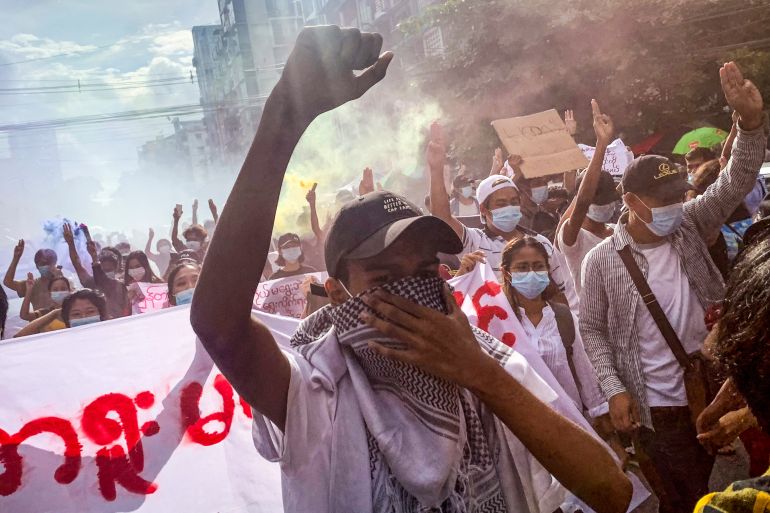
Yangon/Taipei – In Myanmar’s commercial capital Yangon, people are scrambling for hospital beds and looking for oxygen for their COVID-hit family members and friends. Bodies are piling up in cemeteries.
With economic desperation and a deadly virus ravaging the population, neither the military, despite its de facto power, nor the parallel government, with its international influence, has managed to turn the tide of the pandemic or break the political deadlock.
Keep reading
list of 4 itemsUN warned of ‘dire’ COVID situation in Myanmar
Protest erupts at Myanmar’s Insein prison amid COVID outbreak
Myanmar women give birth in jungle as military lies in wait
The military, or Tatmadaw, has sought to control the country in the wake of the February 1 coup, which triggered mass protests and a civil disobedience movement. More than 900 people have been killed and thousands arrested.
The National Unity Government, meanwhile, formed out of the remnants of Aung San Suu Kyi’s overthrown administration in exile or hiding, has also made little headway in its attempt to regain control of the country.
Now the two sides are gearing up for a critical diplomatic battle in the United Nations where the Credentials Committee is scheduled to convene in September and each side is positioning for recognition.
Myanmar’s UN representative Kyaw Moe Tun has maintained his allegiance to Aung San Suu Kyi’s administration, demonstrating his loyalty in a speech to the General Assembly in February.
The military’s attempts to remove him have so far been in vain, but this month Aung Thurein, who left the military this year after 26 years, was nominated by the regime’s foreign minister Wunna Maung Lwin to replace Kyaw Moe Tun.
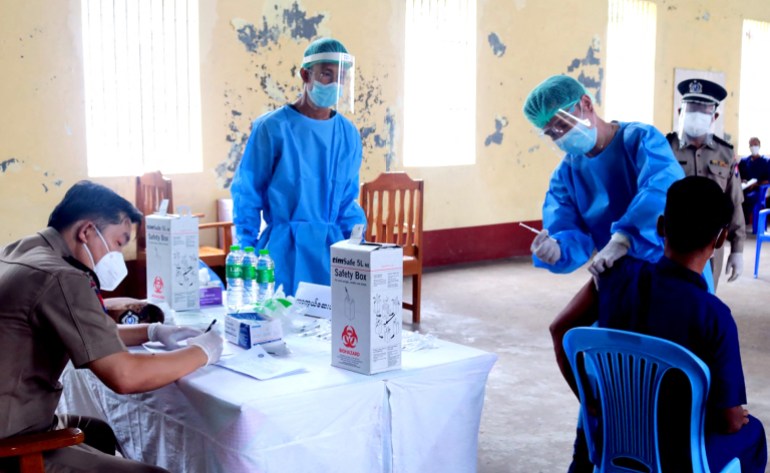
On the ground in Yangon and the Bamar hinterland, even though the NUG has little sway, the population needs little reminding of why the soldiers and generals are unfit to rule, NUG cabinet member Dr Sasa told Al Jazeera in an online interview from an undisclosed location.
“They are a failed coup and a failed regime,” said Sasa, the NUG’s international cooperation minister and spokesperson. “They cannot perform any functions of a government… in healthcare, in education, in the economy.”
Sasa’s criticisms are reflected by the World Bank’s latest economic report on July 26, which warned that Myanmar’s economy faces a contraction of 18 percent this year and a doubling of poverty as a result of the combined impact of the coup and COVID-19.
The bank warned that the crises would lead to “damaging implications for lives, livelihoods, poverty and future growth,” a scathing assessment of the military regime.
The economy is “in free fall”, said a Yangon-based foreign investor who has invested millions of dollars in Myanmar. “The junta is unable to govern in every sense of the word. They have also failed to manage the economic disruption brought by the pandemic-induced lockdown measures, on top of the political turmoil.”
But the World Bank’s dire warnings have also increased pressure on the NUG – which has yet to collectively spell out its humanitarian aid policies or clarify how international partners should channel assistance in military-controlled areas.
Struggle for recognition
As the political crisis drags on and the health crisis deepens the window for the NUG to secure an active role, beyond releasing statements and announcing policies it cannot implement, is also narrowing.
The unity government was formed in secret in mid-April by 20 elected legislators – primarily from Aung San Suu Kyi’s National League for Democracy party.
Some are in exile while others have taken refuge in border areas controlled by ethnic armed groups long opposed to Myanmar’s central government.
Sasa says those remaining in the country include a vice president and prime minister and “several” cabinet colleagues “tapping into virtual diplomacy while being connected with local communities”.
He says the cabinet has no plans to go completely into exile and the NUG “is an e-government” because “our office is in the computers”.
Seeking to make its mark and gather support abroad, the NUG has set up offices in Prague and near Washington, DC. It also has a representative who speaks at the UN and others in some Myanmar embassies who are competing against military appointees.
Despite a chorus of support from foreign politicians, no overseas governments have yet moved to recognise the NUG. The Association of Southeast Asian Nations (ASEAN) declined to even include officials from the group at a summit held in April, inviting only Min Aung Hlaing, the military chief.
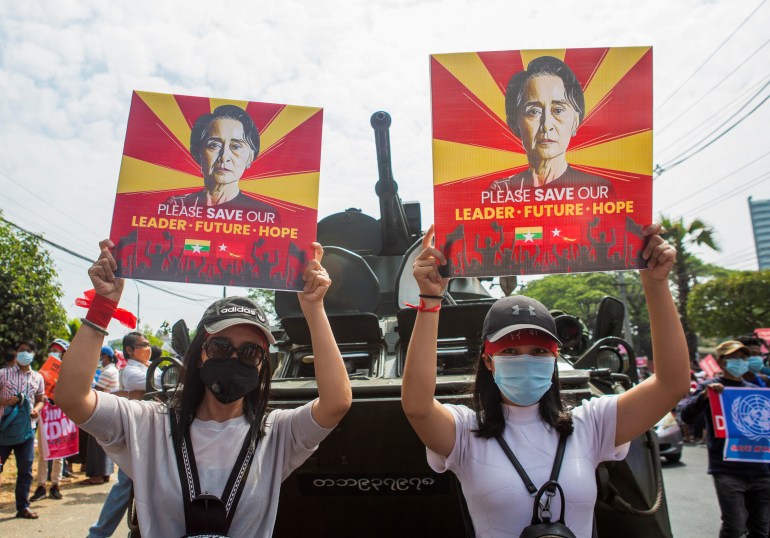
Some say that might not matter, that the NUG’s contacts with governments and parliaments around the world, constitute de facto recognition.
“They may have established even more, and more meaningful, contacts than the SAC has,” said retired Dutch diplomat Laetitia van den Assum, who was ambassador to Myanmar and other ASEAN countries.
The reality, as Van den Assum points out, is that after seizing power six months ago, the military’s State Administration Council (SAC) has not managed to consolidate its coup. “Coups tend to be short, sharp shocks with effective control established very quickly. If that doesn’t happen, then the coup has failed. That is the case in Myanmar,” she said.
“China is probably the only one that has made it clear, publicly, that it has now decided that supporting the SAC is its best bet,” she explained, adding that a number of Asian countries are still “sitting on the fence”.
While other countries have cautioned against any moves that could indicate full recognition of the military regime, the Chinese embassy in Yangon issued a statement referring to Min Aung Hlaing as the “leader of Myanmar” shortly after a meeting between Beijing’s top envoy to the country Chen Hai and the military chief took place.
Meanwhile, China has cold-shouldered the NUG despite its attempts at engagement, a position confirmed by Sasa.
“I don’t really see where the NUG is gaining any traction at all amongst stakeholders in China,” said Jason Tower, Myanmar country head of the United States Institute for Peace.
Sasa believes the tacit support given to the military by Beijing and Moscow, especially in providing weapons, might keep it in power longer but will do little to give the generals the backing of the Myanmar people.
“All the support they are giving to the junta would backfire on China and Russia because the people of Myanmar will not forget how the two countries support the murderers. This is very dangerous for the future of the relationship between China and Myanmar,” he warned.
Rohingya stance
But Aung San Suu Kyi’s own pre-coup defence of the military against accusations of war crimes committed against the Rohingya minority in 2017 has counted heavily against the NUG.
Ambassador Kyaw Moe Tun’s non-committal response to the plight of the Rohingya in the US Congress met with a backlash. California Congressman Ted Lieu indicated in early May that “the US should not support the National Unity Government in Burma unless it includes Rohingya representation” and that it “must commit to stopping the ethnic cleansing actions against the Rohingya”.
Divisions over the Rohingya within the cabinet came to a head when Sasa pushed for the recognition of the Rohingya people. According to foreign diplomats familiar with the NUG’s internal politics, the NLD’s “old guards” pushed back, livid.
But, ultimately Sasa, with his reformist zeal, won the battle: the NUG announced in a policy statement in June that the Rohingya were “entitled to citizenship by laws that will accord with fundamental human rights and democratic federal principles”. It also pledged to repeal Myanmar’s 1982 Citizenship Law, which is underpinned by a complex taxonomy of 135 “national races,” from which the Rohingya are excluded, complicating their ability to gain citizenship. The move was widely applauded by Rohingya activists and human rights groups.
In a dramatic turn after Aung San Suu Kyi’s infamous defence of the Tatmadaw against accusations of genocide at the Hague, the NUG is now supporting the International Court of Justice.
Sasa believes that Aung San Suu Kyi would be “very happy” with the changes. “We cannot undo what was done in the past. But now we have a different leadership,” he said.
Human rights activist Cheery Zahau suspects that the NUG’s decision to reverse past policies on the Rohingya is a reflection of the political impasse it is experiencing. “His [Sasa] advisers probably have told him that this would give them more support internationally,” she said.
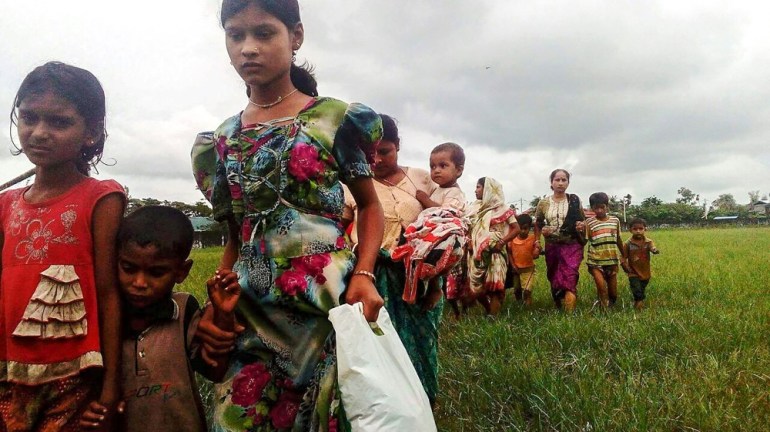
Since Sasa only joined the NLD relatively recently and is from Chin State, he may not be “one of them”, said a senior foreign official who has close contact with the NUG, referring to the old guard of the NLD. But, at the same time, he added, the old guard know they cannot afford to lose him if they want any chance of success, even if they resent his progressive politics.
Parallel governments are nothing new for Myanmar.
Recent examples include the US-based National Coalition Government of the Union of Burma, established in 1990 and only dissolved in 2012, which was led by Aung San Suu Kyi’s cousin Sein Win.
By embedding themselves in ethnic areas and on the borders, the NUG hopes to distinguish itself from its predecessors in being more connected to people and events on the ground.
In the Bamar heartlands, where the military holds sway, the NUG still influences the direction of resistance and strikes as well as international sanctions.
“The NUG is probably more organised than previous exiled governments, but they face similar challenges of legitimacy, and as the conflict drags on, relevance,” warned Myanmar expert David Mathieson.
Diplomatic manoeuvres
Part of that relevance will be put to the test at the UN in September.
“The NUG may have much popular support from flash protesters, some – but not all – local community, People’s Defence Forces and many of the population who have suffered such cruel, barbaric harm at the hands of post-coup occupation forces of the military and riot police, but it is still, as Sasa himself said, an e-government,” said Mary Callahan, a Myanmar expert at the University of Washington.
“It does not have any significant institutions to carry out centrally determined policies or interventions. Not surprisingly, then, it is focused on gaining international recognition.”
Recent developments could offer a glimmer of hope.
In June, the UN General Assembly voted overwhelmingly in favour of a resolution urging member states to “prevent the flow of arms” to Myanmar, with only 31 abstentions – including its biggest patrons China and Russia – and one lone objection, Belarus.
Within the Association of Southeast Asian Nations (ASEAN), tasked with resolving the Myanmar political crisis, Brunei, Laos, Cambodia and Thailand abstained while the rest backed the embargo.
The 10-member bloc was split “from the beginning when some member states turned a blind eye on the Tatmadaw’s raw power grab” while others asked for the release of detained politicians and a return to the democratic process, notes Thitinan Pongsudhirak, director of the Institute of Security and International Studies at Chulalongkorn University in Bangkok.
The UN vote reflects the division “when the same lineup of countries did not support the non-binding resolution against arms sales to Myanmar”, he said, adding that he expects the same pattern of preferences to be repeated if there is a vote on the credentials.
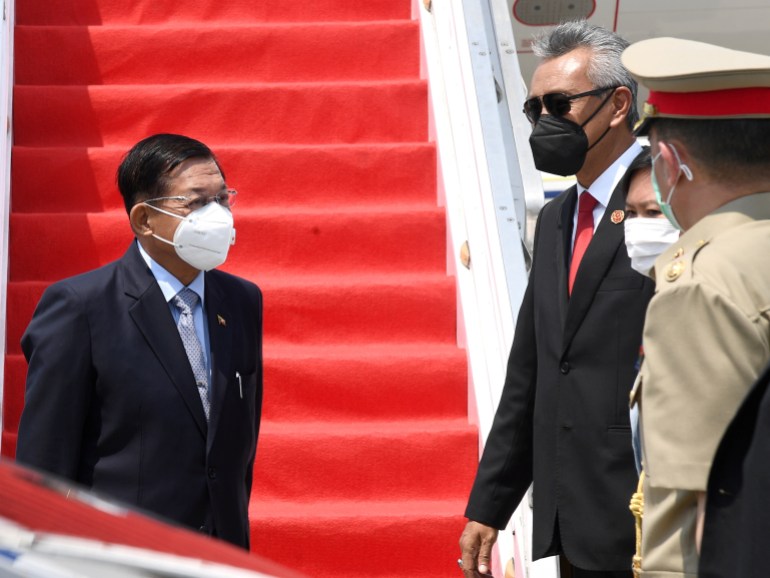
“ASEAN’s litmus test will now be on Myanmar’s legitimate representation at the UN between the military’s SAC and the civilian-led NUG,” he told Al Jazeera. “The major powers in the P5 [permanent members of the UN Security Council] will have a decisive say. If the US goes all the way with NUG recognition with UK and France in support and China and Russia against, then ASEAN’s internal split will be more debilitating.”
Foreign officials from western democratic governments dealing with the NUG say it should keep announcing alternative government policies and programmes for governance, economy and parliament.
By acting as a shadow administration, the NUG would be a reminder to the Myanmar people and the world of why they are preferable to the military, western diplomats in Yangon said. This would help their quest in seeking international support and remaining relevant domestically.
Jason Tower, US Institute of Peace representative in Myanmar, said it was hard to predict how the UN credentials struggle would pan out. No date has been set for the decision.
“Currently, if we look at where things sit within the General Assembly, largely amongst members of the international community, there’s probably a preference for a status quo [for Kyaw Moe Tun],” he said.